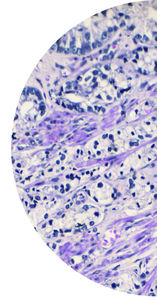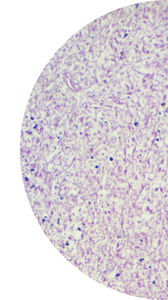
Cancer test kit GENESEEQPRIME™HRDoncologyfor precision medicineCNV
Add to favorites
Compare this product
fo_shop_gate_exact_title
Characteristics
- Applications
- for cancers
- Application field
- oncology, for precision medicine
- Tested parameter
- CNV, HRR, indel, LGR, MMR, MSI, SNV, TMB
- Sample type
- FFPE tissues
Description
GeneseeqPrime™HRD is a next-generation sequencing-based laboratory developed test that analyzes homologous recombination deficiency (HRD)-related genomic instabilities through a genome-wide analysis approach. It also detects genomic alterations in 437 cancer-relevant genes, including BRCA1/2 and other homologous recombination repair (HRR)-relevant genes.
WHO IS IT FOR
Patients with solid tumors seeking precision medicine, including PARP inhibitor selection, other targeted therapy options and immunotherapies
SAMPLE TYPE
Tumor tissue (FFPE block/slides, or frozen tissue)
All-in-one test
-
Genome-wide HRD score by assessing loss of heterozygosity (LOH), telomeric allelic imbalance (TAI), and large-scale state transitions (LST)
-
Genomic alterations in 437 cancer-relevant genes, including 26 HRR genes
-
Identifies numerous mutation types: single nucleotide variants (SNVs), insertions and deletions (indels), copy number variations (CNVs), gene fusions and large genomic rearrangements (LGR)
-
Assesses other key biomarkers: tumor mutation burden (TMB), microsatellite instability (MSI), DNA mismatch repair (MMR) genes, homologous recombination repair (HRR) genes
GeneseeqPrime™HRD Report
-
1 Evaluates HRD score and HRR-gene alterations to inform PARP inhibitor selection
-
2 Assesses TMB, MSI and dMMR with the option to add the PD-L1 immunohistochemistry (IHC) test to better inform immunotherapy decisions
-
3 Provides information on clinically actionable genomic alterations and their associated targeted therapy, both approved drugs and those in clinical trials
-
4 Reveals potential resistance mechanisms to current therapies and options for alternative treatments
Catalogs
No catalogs are available for this product.
See all of Geneseeq‘s catalogsRelated Searches
- Assay kit
- Blood assay kit
- Plasma assay kit
- Molecular test kit
- Oncology test kit
- Tissue detection kit
- Genetic test kit
- Oncology test kit
- Genetic mutation detection kit
- FFPE tissues assay kit
- Cerebral test kit
- BRAF gene test kit
- Colorectal cancer test kit
- Lung cancer detection kit
- Genomic test kit
- Genomic DNA detection kit
- BRAF mutation detection kit
- NGS sequencing assay kit
- KRAS mutation detection kit
- Bone marrow assay kit
*Prices are pre-tax. They exclude delivery charges and customs duties and do not include additional charges for installation or activation options. Prices are indicative only and may vary by country, with changes to the cost of raw materials and exchange rates.






